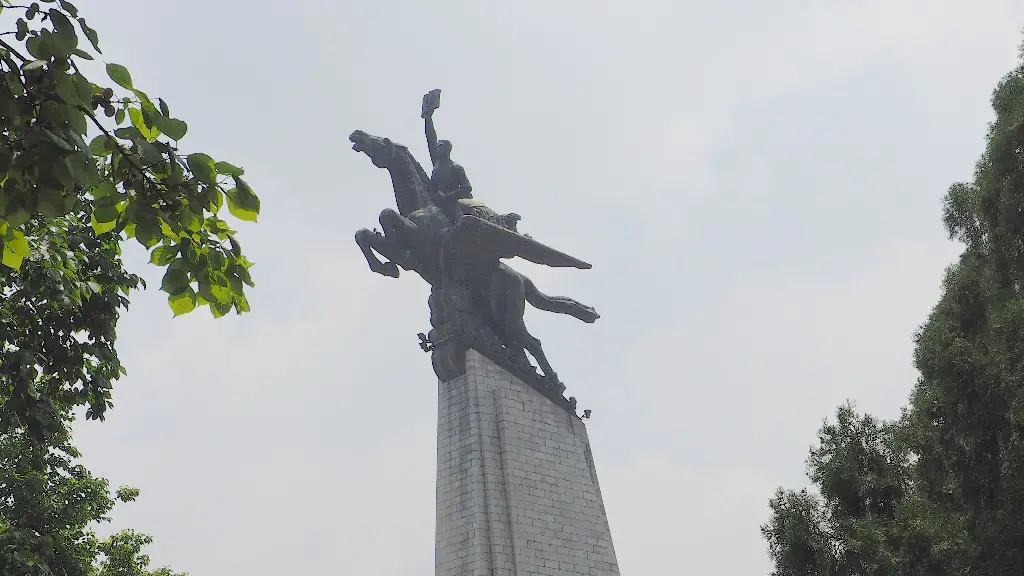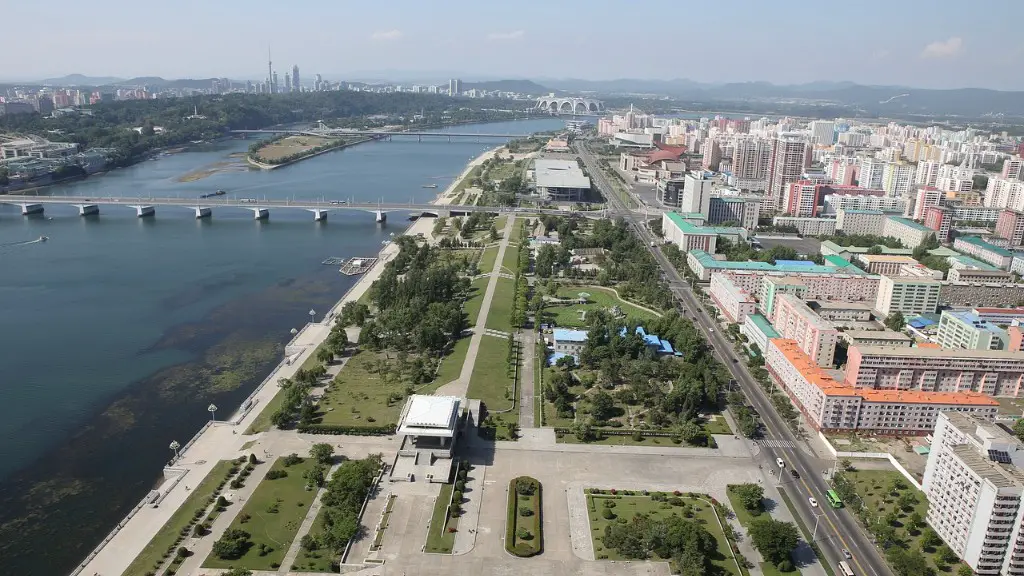Since the 1950s, the US foreign policy with North Korea has moved from mutually beneficial agreements to dealing with a hostile and unpredictable regime. The US has tried several strategies to engage with North Korea from actively pursuing diplomacy and maintaining economic sanctions to withdrawing from negotiations altogether. Throughout the decades, the US has grappled with how to respond to North Korea’s nuclear and missile program and human rights abuses. While the US has often attempted to reach agreements to de-escalate the situation, North Korea’s consistent provocations have forced the US to view the country with distrust.
The US has long maintained economic sanctions on North Korea in response to the country’s nuclear activities and human rights violations. These sanctions have been in place since the 1950s, with some lifted and others imposed as a means of pressuring the North Korean regime. The US also participates in UN Security Council sanctions, which further restrict the North Korean economy. In addition, the US has gradually increased its economic sanctions on North Korea, culminating in a sweeping economic embargo in 2018.
The US has also taken a direct approach to North Korea, most notably with President Donald Trump’s summit with North Korean leader Kim Jong-un in 2018. At the meeting, President Trump and Chairman Kim agreed to work towards the denuclearization of the Korean Peninsula. Since then, the US has continued to urge North Korea to abide by its commitments and begin dismantlement of its nuclear and ballistic missile programs. Despite the summit, North Korea continues to conduct weapons tests and maintain its nuclear capabilities.
In addition to its punitive measures, the US has sought to engage North Korea diplomatically in order to build trust and cooperation between the two countries. As part of this effort, the US has encouraged North Korea to halt its nuclear program and adhere to international law. The US has also tried to use incentives to encourage North Korea to change its behavior, such as offering economic aid and security guarantees. However, these attempts have failed to produce tangible results thus far.
Despite the different approaches taken by the US, North Korea remains an unpredictable and dangerous regime that continues to challenge US foreign policy. The US has yet to find a way to effectively contain North Korea’s nuclear threats or to compel the North Korean government to comply with international law. Thus far, the US has been unsuccessful in its efforts to engage in constructive dialogue with North Korea or to alter its behavior.
Consequences of US Foreign Policy with North Korea
The US foreign policy with North Korea has had significant consequences both domestically and globally. Domestically, the US has had to face the challenge of dealing with an increasingly belligerent and nuclear-armed state. This has forced the US to prioritize military resources to protect its own citizens, while also attempting to maintain peaceful relations with other countries in the region. This has put the US in a difficult position of balancing its own security interests with engaging in diplomatic dialogue with North Korea.
At the same time, North Korea’s nuclear and ballistic missile programs have had far-reaching implications for global security and stability. North Korea’s nuclear weapons program has raised the specter of nuclear war on the Korean Peninsula and heightened tensions between the US and other countries in the region. This has caused serious implications for the safety and security of US allies and international partners. As a result, US foreign policy must not only be tailored to addressing North Korea’s nuclear capabilities, but also its potential to cause wider instability in the region.
The US foreign policy with North Korea has also resulted in wider economic instability in the region. Sanctions have had the dual effect of weakening North Korea’s economy while also preventing countries in the region from engaging in much-needed trade. This has put pressure on countries such as China, South Korea, and Japan to find ways to reduce tensions while also promoting economic cooperation. It has also hampered development in the region, making it difficult for countries to build the economies that are needed to maintain long-term stability.
US Relationships with International Organizations
In order to effectively address the challenges posed by North Korea, the US has had to rely on the help of international organizations. Most notably, the US has worked with the United Nations Security Council to impose sanctions and develop an international consensus on the North Korean issue. The US has also relied on the support of its international allies, such as China, South Korea, and Japan, to pressure North Korea to comply with international law and limit its nuclear activities. In doing so, the US has attempted to gain the international community’s support for its policies and demonstrate its commitment to resolving the North Korean crisis.
The US has also worked with other organizations to ensure its policies with North Korea are consistent with international law. In the past, the US has worked with the International Atomic Energy Agency to verify North Korea’s compliance with non-proliferation agreements. This has provided a way for the US to ensure that North Korea follows the international rules and regulations governing nuclear weapons development.
Finally, the US has sought to create a diplomatic path to resolving the North Korean crisis. The US has worked with international partners to constructing a framework for peaceful negotiations with North Korea and encouraging the North Korean leadership to engage in dialogue. While this approach has had limited success so far, it has provided the US with an opportunity to pursue diplomatic solutions to the North Korean crisis and demonstrate its commitment to diplomatic engagement.
Public Opinion on the US Foreign Policy with North Korea
The American public has generally supported the US foreign policy with North Korea and its efforts to address the challenge of a nuclear-armed North Korean regime. Most Americans agree that the US must take a firm stance with North Korea and prioritize the needs of US citizens and allies. At the same time, there is general agreement that the US should not give up on diplomatic solutions or resort to military options. Most Americans view the US foreign policy with North Korea as a necessary step to ensure peace and stability in the region and beyond.
At the same time, Americans have also voiced their concerns about the US foreign policy with North Korea. Many are worried that the US is not doing enough to ensure that North Korea abides by international agreements and that economic sanctions have only served to weaken the North Korean people without imposing any real change in the country’s behavior. Others are concerned that the US is too willing to trust North Korea and has not done enough to verify that North Korea is following through on its commitments to denuclearization.
At the same time, some Americans have voiced their concern about US foreign policy with North Korea creating tensions with countries in the region. Since the US has been the driver of the UN Security Council sanctions, countries such as China, South Korea, and Japan have been put in a difficult position. Many Americans worry that the economic fallout from US-led sanctions will have long-term economic effects on these countries and will ultimately harm US allies and international partners.
The Future of US Foreign Policy with North Korea
The future of US foreign policy with North Korea will largely depend on the US and North Korea’s willingness to cooperate and come to an agreement. Despite the consistent provocations of the North Korean regime, the US continues to pursue diplomatic solutions and has maintained an open dialogue with North Korea. The US is also working with international partners to develop a framework for negotiations and has begun the process of lifting sanctions in exchange for North Korea’s commitment to denuclearization.
At the same time, the US must be prepared to respond to North Korea’s provocations with strength and resolve. The US must continue to maintain a strong military presence in the region to deter North Korea’s aggression and demonstrate its commitment to protecting its allies. The US must also be prepared to respond to North Korea’s nuclear capabilities with diplomatic solutions that can ensure the safety and security of all countries in the region.
Ultimately, the US must remain steadfast in its commitment to a peaceful resolution of the North Korean crisis. The US must ensure that its foreign policies are based on diplomacy and dialogue instead of military intervention. This will require the US to work closely with its international partners to come up with a comprehensive plan for de-escalation, while also maintaining its commitment to defending its allies and imposing sanctions if necessary. Only by doing so can the US hope to find a pathway to peace with North Korea.
Impact of US Foreign Policy with North Korea on the Region
The US foreign policy with North Korea has had a dramatic impact on the region. US-led sanctions and UN Security Council resolutions have weakened North Korea’s economy and harmed its citizens. At the same time, the US has had to maintain a robust military presence in the region, which has put its allies in an uneasy position. The long-term economic implications of US-led sanctions have also been felt in countries such as China, South Korea, and Japan, as they have been unable to take full advantage of trade opportunities with North Korea.
At the same time, US foreign policy with North Korea has had a positive impact on the region. The US has been able to maintain a peaceful relationship with North Korea and encourage it to uphold international law. The US has also engaged in diplomatic negotiations with North Korea and provided economic incentives in order to bring it back to the bargaining table. This has made it possible to reduce tensions in the region, while also helping to ensure that North Korea follows through on its commitment to denuclearization.
Finally, US foreign policy with North Korea has given the region an opportunity to work together to ensure peace and stability. The US has provided support to countries in the region and encouraged diplomatic dialogue between North Korea and its neighbors. This has created an atmosphere of cooperation, which could pave the way for long-term economic development in the region and provide a foundation for peace.
US Foreign Policy with North Korea and the International Community
US foreign policy with North Korea has had ramifications for the international community. US-led sanctions have weakened North Korea’s economy and interfered with the free flow of trade in the region. At the same time, the US has sought to rally the international community in support of its efforts to bring North Korea back to the negotiating table. This has led to some success, as the US has been able to garner international support for its diplomatic efforts and rally the international community in support of its policies.
At the same time, US foreign policy with North Korea has had the effect of further isolating the country. US-led sanctions have impaired North Korea’s ability to trade and engage in economic activity, while also limiting its access to foreign aid. The US has also sought to limit North Korea’s access to international aid and impede its diplomatic relationships with other countries. This has left North Korea increasingly isolated from the international community and unable to access much-needed resources.
Finally, US foreign policy with North Korea has raised questions of international law and sovereignty. US sanctions have impinged upon North Korea’s right to self-determination and interfered with its ability to pursue its own interests. This has raised questions about the US’s commitment to international law and its willingness to respect the rights of other countries. It has also raised concerns about the US’s role in shaping the international system and its capacity to resolve the North Korean crisis without resorting to violence.





